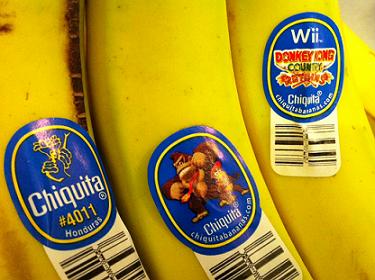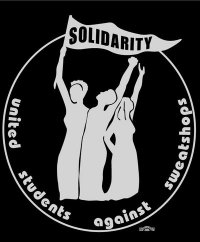
The families of the murdered union leaders, however, would probably cringe, and painfully ask, “Why not just raise wages for Chiquita banana pickers instead of spending millions on a video game?”
Perhaps someday, Chiquita and other mega-corporations will be forced to place a sticker on their product that will allow consumers to scan it with a cell phone to download information telling them where the product was made, how much the workers were paid, and how they were treated.
Advocates for corporate transparency argue for stickers on products which explain the labor process that the product went through before it arrived in the store. This is just one idea being floated around by labor rights activists who continue to struggle for a true fair trade that puts people over profit. But putting such stickers on products wouldn’t come easily as corporations would go bananas and put up a bitter fight.
The products we use and the food we eat in the US comes from a number of questionable work spaces. From sweatshops to corporations funding paramilitaries, the businesses that supply the US market often violate human rights and law across the globe. At the same time, workers and workers’ advocacy organizations are fighting back in new and creative ways.
Bananas and Paramilitaries
Throughout the last 15 years, Chiquita has violently repressed banana pickers and union leaders fighting for higher wages and better working conditions. The Ohio-based fruit and vegetable giant paid large sums of cash to the right-wing and violent paramilitary group the United Self-Defense Forces of Colombia (AUC) from 1997 to 2004, years in which this militia intensified violence against union leaders. The AUC has also been linked to rich landowners, petroleum companies and the Colombian military.
Chiquita, after admitting to making the payments, claimed to the US government it was paying-off AUC so to actually protect banana workers. The apparent deal didn’t do any good, as AUC committed 100 massacres, killing 1,000 civilians, in 2001, according to sources including the US State Department. That same year, the Colombian Attorney General’s office accused Chiquita of shipping 3,400 AK-47 assault rifles and millions of rounds to a dock controlled by Banadex, which is Chiquita’s subsidy in Colombia and the regional employer of its banana pickers.
The US State Department also designated AUC a terrorist group right after 9/11. By the way, giving a designated terrorist group any material assistance, even legal advice let alone weapons, is an automatic sentence of 15 years in prison – if found guilty. But apparently Chiquita executives are way above federal law; the banana giant only had to pay a fine of $25 million.
Chiquita’s own “Special Committee”, called at the bequest of shareholders and board members, found no evidence that Chiquita’s payments directly resulted in the massacres. Yet independent researchers have exposed an inglorious past showing Chiquita’s intimidation and violence against union leaders is not a well-kept secret. Indeed, the pattern of repression goes back to the 1920s.
The current lawsuit against Chiquita, representing over 800 Colombian victims of violence, is before US District Judge Kenneth Marra of the Southern District of Florida and awaiting his go-ahead. The lawsuit is asking for over a billion dollars in damages; Chiquita has claimed it makes nearly $4 billion in annual revenue.
“What makes this unique is that this company has admitted to making payments to terrorists,” says Lee Wolosky, a former White House counter-terrorism official and current attorney for New York-based Boise, Schiller and Flexner, which is representing the Colombian victims. “Chiquita has paid a significant fine to the US government in connection with its illegal acts, but is yet to provide compensation to those victimized by the designated terrorist organizations.”
Just like a label offering consumers information on whether a worker’s human rights were violated, the use of highly-skilled lawyers to represent global workers is another tactic that has gained serious traction among workers’ rights advocates.
Meanwhile, as the Chiquita case continues in court, the US Congress is mulling a trade agreement with Colombia. According to US Rep. George Miller (D-CA), Colombia has earned the reputation as the most dangerous country on Earth for workers. During the last eight years, 570 union members were assassinated, roughly 150 within the last three years. Much of this violence against Colombian workers is perpetuated by the country’s military. Rep. Miller claims the current free trade plan with Colombia, if implemented, will not change a thing when it comes to violence against workers, essentially meaning more Colombians will be murdered with America’s corporate blessing.
The Fox Guarding the Hen House
“There are a lot of examples of campaigns that have been successful, and there’s a lot of innovative ways to be successful. There are companies that take these issues seriously, and want to work with independent third parties that fight for workers’ advocacy, but it’s still an uphill battle,” says Tim Newton, spokesperson for the Washington-based International Labor Rights Forum (ILRF), adding that that an estimated 200 million children between ages 5 to 14 continue to toil in sweatshops and on farms, making and harvesting goods mostly bound for Western consumers.
Newton says the ILRF’s own “Working for Scrooge” report, released every year just before the Holiday season, is an immediate attention-grabber simply because of its title. The ILRF annually selects five corporations based on their record of suppressing workers from organizing during the previous year. The top offenders for 2010 were: Bangladesh Garment Manufacturers and Exporters Association (or BGMEA, which exports to Walmart, JC Penney, Sears, Kohl’s, among others), Chiquita, Dole, Del Monte, and RJ Reynolds Tobacco Company.
Another effective tactic for supporting workers toiling at the roots of the global supply chain is simply gaining an understanding of the reality that these workers live in, and who their true advocates are.
 The United Students Against Sweatshops (USAS), a grassroots organization of vocal youth and students who advocate for garment workers making collegiate licensed apparel, has for much of this decade butted heads with a workers’ rights organization they consider an imposter – The Fair Labor Association (FLA).
The United Students Against Sweatshops (USAS), a grassroots organization of vocal youth and students who advocate for garment workers making collegiate licensed apparel, has for much of this decade butted heads with a workers’ rights organization they consider an imposter – The Fair Labor Association (FLA).
The FLA sells itself as a workers’ watchdog. They claim they are a cooperative of apparel corporations (Nike, Adidas, etc.) and colleges (Penn State, for instance) seeking to improve working conditions in factories on their global supply chains.
The FLA says they act as a third-party monitoring their members’ factories, and publicly disclosing what they find. However, the USAS claims the FLA was created by Nike and Adidas, with help from the White House and in direct response to rising student awareness of sweatshop conditions overseas.
The USAS notes that board members of the FLA include Amanda Tucker of Nike and Gregg Nebel of Adidas. A clear example of FLA’s whitewashing of Nike occurred in 2009 after Nike suddenly closed two factories in Honduras that made college-branded T-shirts. Besides 1,800 workers losing their jobs, the workers were denied their legally-mandated severance pay. The USAS says the FLA acted the stooge and did nothing.
The USAS eventually won the 1,800 workers their severance pay after initiating a university-wide “Just Pay It” campaign.
The USAS’s Teresa Cheng says a far more effective workers-rights watchdog is the Workers Rights Consortium (WRC). The USAS backs the WRC, says Cheng, calling it an independent labor rights monitoring organization and a true friend to those workers being exploited on the global supply chain.
For ten years now the USAS has urged college presidents and other university leadership to disaffiliate from the FLA, highlighting their efforts with the ongoing campaign, “Don’t Pay the FLA.”
“The Fair Labor Association is a fundamentally flawed organization and has a track record of failing to uphold workers’ rights because its Board of Directors is dominated by the very corporations profiting off the sweatshops it’s supposed to be monitoring,” says Cheng. “Sort of like the fox guarding the henhouse.”
John Lasker is a freelance journalist from Ohio.
